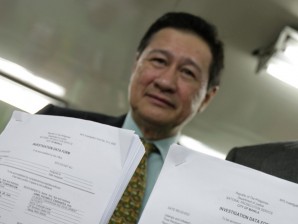Former Solicitor General Francisco Chavez has kept his word to Senator Francis “Chiz” Escudero.
Chavez on Monday petitioned the Supreme Court to freeze the Judicial and Bar Council (JBC) screening process for the 24th Chief Justice for its “antipodean departure” from the constitutional provision on its composition.
Calling it “patently unconstitutional, the practice of the JBC to allow both representatives of the Senate and the House of Representatives to participate in its proceedings was “a dangerous by-product of a flawed premise,” Chavez said.
“We cannot allow this error to perpetuate itself by the inaction of lawyers, the public and the taxpayers,” Chavez told reporters after filing the 54-page petition.
Escudero, chairman of the Senate justice committee, earlier dared those questioning the JBC composition to go to the Supreme Court.
“Under Senate and House rules, that’s part of our job as the respective chairs of the committees of justice in both houses,” Escudero said.
“The position of the JBC is that unless enjoined by the court in a contrary opinion, the JBC will not change the procedures it had been observing before,” he said.
In seeking the issuance of a temporary restraining order, Chavez said the current JBC composition violated Section 8, Article VIII of the Constitution, which provided that only “one representative from the Congress” should join the council as ex-officio member.
The Constitution says: “A Judicial and Bar Council is hereby created under the supervision of the Supreme Court composed of the Chief Justice as ex-officio chair, the secretary of justice and a representative of Congress as ex-officio members, a representative of the Integrated Bar, a professor of law, a retired member of the Supreme Court and a representative of the private sector.”
Chavez said the Constitution also plainly stated that the JBC, the body vetting applicants for ranking judicial posts, must only have seven members.
The provision is “clear, definite and needs no interpretation,” he said in his petition.
